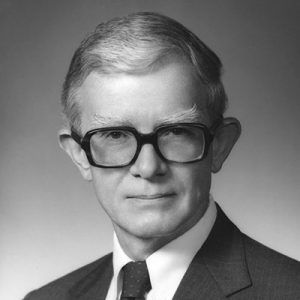calsfoundation@cals.org
Garnett Thomas (Tom) Eisele (1923–2017)
Garnett Thomas (Tom) Eisele was a lawyer, veteran of the U.S. military, and judge. Serving for forty-one years as a federal district judge for the Eastern District of Arkansas, Eisele—a lifelong Republican—was on the bench during a time of dramatic change in Arkansas legal history. Eisele gained a reputation for fairness and probity in a period when Arkansas was emerging from Jim Crow–era discriminatory practices concerning race, law enforcement, and the justice system.
Tom Eisele was born in Hot Springs (Garland County) on November 3, 1923, to Arkansas native Mary Eisele and Missouri native Garnett Eisele, who was a druggist. His grandfather, Will Martin, was a lawyer. In Hot Springs, Eisele enjoyed the benefits of a middle-class upbringing. He attended St. John’s School, and after graduating, he enrolled at the University of Florida but did not graduate. After two years attending school in Florida, he studied at the University of Indiana. Eisele served in the U.S. Army during World War II, which disrupted his education. He was sent to Germany in early 1945, shortly after the Battle of the Bulge. After returning from Europe, Eisele attended Washington University in St. Louis, Missouri, graduating in 1947. He went on to obtain an LLB and LLM from Harvard University law school. In 1952, he joined the U.S. Naval Reserve, where he served for nine years.
In 1950, he married Kathryn Freygang, who was born in New York City and moved to Massachusetts as a teenager. She and Eisele met while he was studying at Harvard. The couple had four children.
After graduating from Harvard, Eisele practiced law in Hot Springs at his grandfather’s firm. Two years later, he became assistant U.S. attorney for the Eastern District of Arkansas, where he worked from 1953 to 1956. In 1956, he joined the law firm of Owens, McHaney, Lofton & McHaney. Eisele was an Eisenhower Republican who supported the Brown v. Board of Education decision that ruled segregated schools unconstitutional and would later make rulings that expanded and protected civil rights.
In 1966, with his Republican background and reformist leanings, Eisele became legal adviser to Winthrop Rockefeller (who paid him an honorary $1 a year). Eisele worked closely with Tom Murton, the controversial prison reformer, whom he had helped bring to Arkansas from California to improve conditions at Tucker prison farm. In 1969, Eisele was elected to serve on the Arkansas constitutional convention, although a new constitution was not adopted. Eisele worked for Rockefeller until Richard Nixon nominated Eisele for the federal bench. On August 6, 1970, the Senate confirmed Eisele’s appointment as judge for the U.S. District Court for the Eastern District of Arkansas.
As a judge, Eisele played a prominent role in transforming Arkansas’s relationship with the federal courts, especially in terms of civil rights and prison reform. Eisele became a judge a few months before the landmark Holt v. Sarver decision, which ruled that the entire Arkansas prison system was unconstitutional. Twelve years later, in August 1982, Eisele ruled that the prisons in Arkansas were again constitutional, having become compliant with the Eighth and Fourteenth amendments.
Eisele had a reputation as a fair and impartial judge who made lawyers feel comfortable in his courtroom. He was a proponent of Arkansas modernizing its parole system, and he disliked mandatory sentencing laws, which defanged judges as well as disempowering those convicted of crimes, who might have benefited from more lenient rulings. For his efforts, in 1977, the Association of Trial Lawyers of America named him Outstanding Federal Judge. Eisele was typically humble about the award, saying, “I’m not even the best trial judge in Arkansas.” In 1980, the publication American Trial Lawyer named him Best District Judge in the Eighth Circuit Court.
Eisele ruled on a number of important and controversial cases, involving everything from the students in the Earle Race Riot of 1970 to the Kenneth Starr investigations during the Clinton presidency. In 1984, he handed down the final ruling in the case of Phillips, et al., v. Weeks, et al., which ruled that certain practices of the Little Rock (Pulaski County) police force, such as keeping men in racially segregated cells, were unconstitutional.
From 1975 to 1991, Eisele served as chief judge for the Eastern District, and on August 1, 1991, he became a senior judge. He served in that capacity until his retirement in 2011. Eisele’s wife died in 2010.
Eisele died on November 26, 2017. He is buried in Mount Holly Cemetery in Little Rock.
A few years before his death, the University of Arkansas at Little Rock established the G. Thomas Eisele Endowment for the Study of the United States Federal Courts in Arkansas. The endowment provides for $1,000 for researchers working on scholarship concerning the role of the federal courts in Arkansas’s legal history.
For additional information:
Field, Hunter. “Federal Judge Eisele, 94, Dies.” Arkansas Democrat-Gazette, November 27, 2017, pp. 1B, 3B.
G. Thomas Eisele Papers. Butler Center for Arkansas Studies. Central Arkansas Library System, Little Rock, Arkansas.
“Garnet [sic] Thomas Eisele.” Character Collection, University of Arkansas at Little Rock Center for Arkansas History and Culture. https://ualrexhibits.org/characters/judge-garnet-thomas-eisele/ (accessed May 12, 2023).
Garnett Thomas Eisele Papers. Center for Arkansas History and Culture. University of Arkansas at Little Rock, Little Rock, Arkansas.
Smith, Doug. “Eisele Remains Largely Unfazed by Major Honor.” Arkansas Gazette, August 11, 1977, pp. 1B, 10B.
Colin Woodward
Lee Family Digital Archive, Stratford Hall
 Civil Rights Movement (Twentieth Century)
Civil Rights Movement (Twentieth Century) Divergent Prosperity and the Arc of Reform, 1968–2022
Divergent Prosperity and the Arc of Reform, 1968–2022 Law
Law G. Thomas Eisele
G. Thomas Eisele 



Comments
No comments on this entry yet.